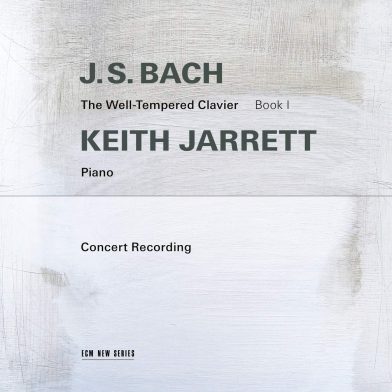 In 1988 ECM released Keith Jarrett’s studio recording of Bach’s Well-Tempered Clavier, Book One. ECM has now released a live version of the same music. The live recording and performance took place at the Troy Savings Bank Music Hall in upstate New York in 1987.
In 1988 ECM released Keith Jarrett’s studio recording of Bach’s Well-Tempered Clavier, Book One. ECM has now released a live version of the same music. The live recording and performance took place at the Troy Savings Bank Music Hall in upstate New York in 1987.
The Well-Tempered Clavier, or in German Das wohltemperierte Klavier, is a book of preludes and fugues in all 24 major and minor keys. Composed in 1722, Bach indicated on the manuscript that the compositions were “for the profit and use of musical youth desirous of learning, and especially for the pastime of those already skilled in this study.” Twenty years later Bach would write a second book of preludes and fugues.
The set contains 24 pairs of preludes and fugues. The first pair is in C major, the second in C minor, the third in C sharp major, and the fourth in C sharp minor, and so on. The rising chromatic pattern continues until every key has been represented, finishing with a B minor fugue. This format captivated many other composers who published similar studies. Shostakovich’s 24 Preludes and Fugues, Op. 87 composed in 1950 is among my favorites, followed by Chopin’s 25 Preludes, Op. 28. Chopin approached this differently. His chosen key sequence is a circle of fifths, with each major key being followed by its relative minor. A contemporary approach was composed by local pianist Tom McDermott whose “All the Keys,” released in 1995, is a similar cycle of 24 pieces in all the major and minor keys.
Bach’s Well-Tempered Clavier has been recorded by many pianists. The most talked-about recording is by Glenn Gould, but a recent favorite is by Angela Hewitt. Hewitt plays a Fazioli piano which to my ears is warmer and fuller sounding. And I like the subtle liberties she takes with the dynamics and tempo. On the other hand, I find Gould emotionally detached—his technical wizardry is highlighted and is played a bit too fast. Andras Schiff is another favorite of mine.
Jarrett’s reading is without embellishment and although I found Angela Hewitt’s take satisfying, Jarrett’s shadings come entirely from the subtleties of his keyboard. Technically perfect, but unlike Gould, Jarrett’s reading is straight-up Bach with no frills. Jarrett has said often of his interpretations—the composer’s music speaks for itself. Jarrett’s approach is much like Andras Schiff’s interpretation, also released on ECM in 2012. Like Schiff, Jarrett’s reading is meditative and his playing is clear and in control of the tempos. Bach’s Well Tempered Clavier may be the most hauntingly beautiful music ever written—I’m not sure how anyone can live a life without hearing this. You can’t go wrong with Jarrett’s recording and I would strongly recommend purchasing this CD knowing that when you leave this earthly plane your spirit will be filled with this magnificent music.




